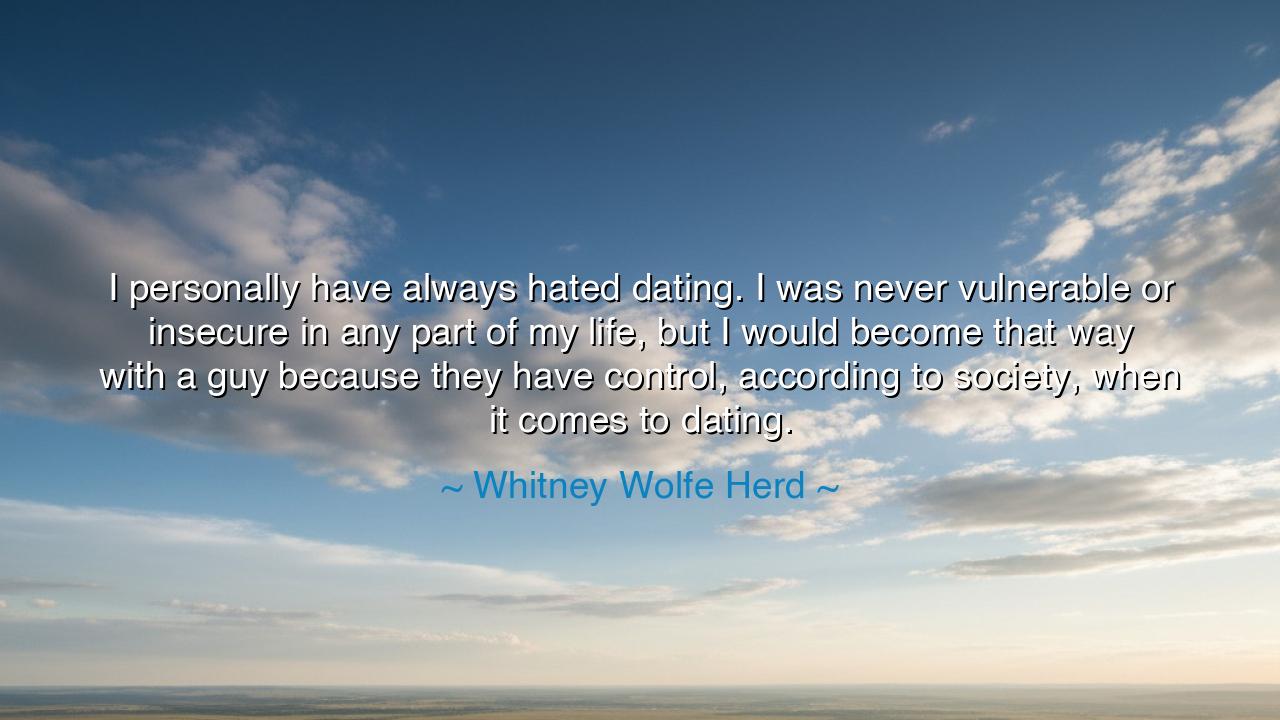
I personally have always hated dating. I was never vulnerable or
I personally have always hated dating. I was never vulnerable or insecure in any part of my life, but I would become that way with a guy because they have control, according to society, when it comes to dating.






The words of Whitney Wolfe Herd — “I personally have always hated dating. I was never vulnerable or insecure in any part of my life, but I would become that way with a guy because they have control, according to society, when it comes to dating.” — rise not merely as a personal confession, but as a declaration of awakening. Beneath her words flows the ancient struggle between power and vulnerability, between the self’s inner strength and the invisible chains of expectation that society forges around love. Her reflection is not one of bitterness, but of revelation — a recognition that the very fabric of human connection has too often been woven in imbalance, where one gives and the other commands. In these few words, Wolfe Herd exposes a truth older than empires: that when love becomes conquest, tenderness turns into fear.
Her statement springs from a world in which women’s vulnerability has long been mistaken for virtue. For centuries, societies taught that in romance, men must pursue and women must yield, that to be desired was glory enough. Even the brave and brilliant, the creators and thinkers, have found themselves diminished by this quiet tyranny. Wolfe Herd’s confession — that she, strong in every other realm, would “become insecure” only in dating — reflects the depth of this conditioning. It reveals how deeply social laws can shape emotion, how even a confident spirit may falter beneath unseen expectations. Her insight pierces through this illusion, reminding us that the cage of tradition can confine not only the body but also the heart.
Yet, from this discomfort was born revolution, both personal and cultural. For Wolfe Herd, this realization was not an end but a beginning — the spark that led her to found Bumble, a platform designed to reverse that ancient dynamic. In her reimagining of dating, she gave women the power to initiate, to speak first, to act from agency rather than reaction. It was a quiet act of rebellion — the modern echo of what philosophers and warriors of old would have called the reclaiming of balance. In this, her words and her actions become one: to challenge the unspoken rule that control in love belongs to one side is to restore dignity to both. For in equality, love becomes partnership; without it, it remains performance.
The wisdom within her words finds ancient echoes. Consider the legend of Antigone, the daughter of Oedipus, who stood before the king of Thebes and defied him, choosing moral truth over submission. Though her struggle was not about love in the romantic sense, it mirrors Wolfe Herd’s defiance against inherited structures of power. Both women saw that obedience to unjust rules — whether in politics or affection — erodes the soul. Both understood that the courage to challenge custom is the beginning of freedom. The strength to say, “I hate this imbalance; I will remake it,” is the essence of heroism.
Wolfe Herd’s words also remind us that vulnerability, though feared, is not weakness. What she once “hated” in dating was not the act of vulnerability itself, but the way society weaponized it — turning openness into submission. Yet true vulnerability, freely chosen and mutual, is sacred. When power is shared equally, vulnerability becomes the soil in which intimacy grows. The ancients knew this too: in the dialogues of Plato, love (eros) was described as the meeting of two halves seeking wholeness. But when one half dominates, the circle can never close. To restore that symmetry — to allow both sides to seek, to speak, to trust — is to return love to its divine form.
Her experience teaches that even the most confident souls may be unmade by systems that deny their equality. It is not personal weakness, but cultural inheritance, that feeds such imbalance. And so the lesson in her words is both personal and universal: that each of us must unlearn the old hierarchies of the heart. We must refuse to let others — or tradition — dictate who may act, who may speak, who may lead in love. For love, if it is real, cannot be ruled. It is not a battlefield of dominance and surrender, but a temple built on mutual regard.
So let us carry forth the wisdom of Whitney Wolfe Herd, who turned discomfort into purpose and reflection into reform. Let us challenge the quiet injustices that hide in our customs, even those disguised as romance. Let women and men alike approach love not as conquerors or as prey, but as equals — each strong, each vulnerable, each free. And when you next find yourself shrinking to fit another’s idea of what love should be, remember her words: the heart is not meant to bow. For true affection is not control but communion — not the surrender of power, but the sharing of it. Only when we love as equals do we step fully into the divine rhythm that binds all creation together — the rhythm of respect, courage, and freedom.






AAdministratorAdministrator
Welcome, honored guests. Please leave a comment, we will respond soon